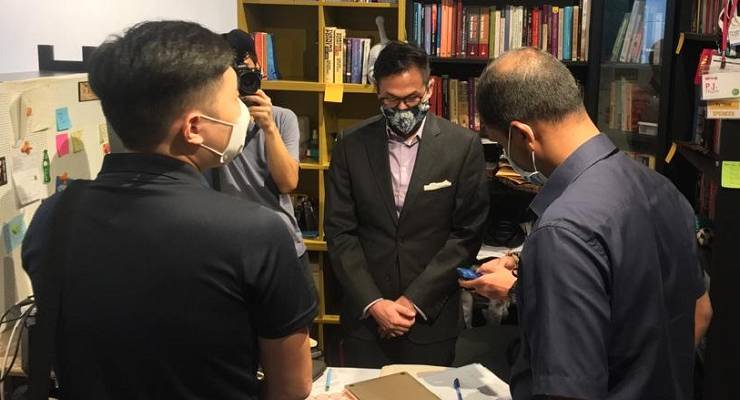
Singapore is often hailed as a beacon of democracy and rule of law in a region with a growing trend of authoritarian regimes shuttering free press and cracking down on government critics.
But earlier this month, Singapore’s Elections Department announced that a police report had been filed against independent media outlet New Naratif, alleging it had published paid advertisements during the general elections in July that amounted to illegal election activity under the punitive Parliamentary Elections Act.
Then, on September 21, New Naratif’s founder and managing director Dr Ping Tjin (PJ) Thum was summoned by police and interrogated for four hours before officers escorted him to his apartment and seized his laptop.
Under the act, the definition of “election activity” and “election advertising” is so broad that it effectively criminalises all political speech during the election period, allowing senior politicians and officials to take selective action against critics and independent media.
Thum told Crikey this week the crackdown follows a pattern over previous election cycles where Singapore’s People’s Action Party, led by Prime Minister Lee Hsien Loong, uses the act to attack government critics.
“It’s part of a very tired pattern,” he says. “They use these extremely unsophisticated methods and clumsy attacks using these incredibly broad laws.”
The government claims the Elections Department is independent from the prime minister’s office, but Thum and multiple observers say they are essentially one and the same, with ASEAN Parliamentarians for Human Rights condemning Singapore’s elections as “neither free nor fair”.
The police report referred to five boosted posts on New Naratif’s Facebook page, but only one was taken down by authorities via Facebook — a satirical video which explained how Singaporean laws are so broad as to effectively make swathes of legitimate political activity illegal without a permit, allowing officials to harass critics but ignore supporters.
Thum said Singapore over-relies on its “beacon of democracy” image to attract foreign investment to drive its economy, and highlighted that half its GDP comes primarily from foreign-backed companies.
“The fact that foreign companies can lobby ministers for changes in the law and that’s OK, but lobbying for democratic rights, civil liberties, that’s not OK,” he says. “This is the contradiction that we navigate.
“Singapore has massive investment from the EU, from the West. It’s tried to maintain a global reputation … and so we are able to utilise that when fighting back in protecting civil liberties.”
New Naratif indeed knows how to have its voice heard. The International Press Institute (IPI), the Singapore Democratic Party and a dozen other organisations and supporters have issued solidarity statements for its recent plight.
“The police complaint against New Naratif is a blatant attempt to silence a leading independent media outlet and demonstrates the intolerance of the government towards critical voices in the country”, IPI executive director Barbara Trionfi says.
Thum said conservative, authoritarian governments like Singapore’s — and those around the world — believe checks and balances and accountability simply get in their way.
“But if you don’t have transparency and accountability — if you don’t have an independent media, it then erodes all the things on which good governance and democracy rely upon,” he says.
Mark Tilly is an Australian journalist formerly based in south-east Asia, and has written for New Naratif.







Crikey is committed to hosting lively discussions. Help us keep the conversation useful, interesting and welcoming. We aim to publish comments quickly in the interest of promoting robust conversation, but we’re a small team and we deploy filters to protect against legal risk. Occasionally your comment may be held up while we review, but we’re working as fast as we can to keep the conversation rolling.
The Crikey comment section is members-only content. Please subscribe to leave a comment.
The Crikey comment section is members-only content. Please login to leave a comment.